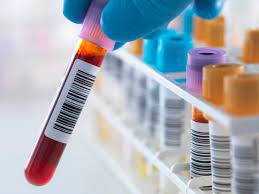A normal blood potassium level

Most potassium (98%) in the body is intracellular – with a small proportion in the extracellular compartment. Therefore the blood potassium level only a reflection of the more important (intracellular) level.
Normal blood potassium level
Normal human blood potassium level is 3.5-5.3 mmol/L.
- A high blood potassium level (hypokalaemia) is over 5.3 mmol/L
- Mild (5.4-6.0 mmol/L) – concern
- Moderate (6.1-6.5 mmol/L) – requires action today
- Severe (>6.5 mmol/L) – requires hospital admission and action today.
- A low blood potassium level (hyperkalaemia) is under 3.5 mmol/L
- Mild (3-3.4 mmol/L) – concern
- Moderate (2.5-2.9 mmol/L) – requires action
- Severe (<2.5 mmol/L) – requires action today.
Causes of high blood potassium (hyperkalaemia)
- Medications (commonest cause): potassium-sparing diuretics (e.g. spironolactone), ACE inhibitors, beta-blockers, NSAIDs, digoxin.
- Kidney disease: AKI (especially rhabdomyolysis (muscle breakdown) and/or long lie), CKD, nephrotic syndrome, renal tubular acidosis (Type IV RTA; rare).
-
Hormonal imbalance: hypoaldosteronism, adrenal insufficiency (e.g. Addison’s disease).
- Cell lysis: major trauma, burns, tumour lysis syndrome.
-
Metabolic acidosis: e.g. diabetes (DKA), lactic acidosis, salicylate overdose, AKI.
- Upper GI bleeding.
-
Genetic disorders: hyperkalemic periodic paralysis (rare).
Note. High dietary potassium intake is a rare cause.
Note. Factitious hyperkalaemia can occur if the sample bottle is shaken or there is delay taking it to the laboratory.
Causes of low blood potassium (hypokalaemia)
- Diuretics (commonest cause): loop and thiazide diuretics.
- Other medications: insulin, beta-agonists, corticosteroids, theophylline.
- Potassium loss
- Gastrointestinal: diarrhoea, vomiting, laxative abuse
- Renal: renal tubular acidosis (Type I and III RTA); renal tubular transport defects (Bartters, Gitelmans or Liddle syndromes); Fanconi syndrome (all rare)
- Other: sweating.
- Hormonal imbalances: hyperaldosteronism (e.g. Cushing’s and Conn’s syndrome), phaeochromocytoma (high catecholamines)
- Magnesium deficiency: impairs potassium regulation
-
Alkalosis: respiratory or metabolic.
- Genetic disorders: hypokalemic periodic paralysis (rare).
Note. Low dietary potassium intake is a rare cause.
Other resources
Hyperkalaemia review article: Simon, 2023
Hypokalaemia review article: Castro, 2024

